Analyzing the Impact of Pop Culture and Media on Society
VerifiedAdded on 2022/11/25
|7
|1472
|349
Essay
AI Summary
This essay critically analyzes the impact of pop culture and media on the social and political attitudes and values of individuals. It begins by defining popular culture and its pervasive influence through mass media, particularly on younger generations. The discussion explores how media, including television and social media, shapes beliefs, attitudes, and the democratic process. The essay examines how exposure to media messages can influence views on social issues, success, and political events. It highlights the role of media in shaping perceptions of politicians, political events, and voting behavior, concluding that while media can significantly impact public opinion, a critical approach to media consumption is essential to mitigate its influence. The essay references several academic sources to support its claims, including works on media's influence, popular culture, and political communication.
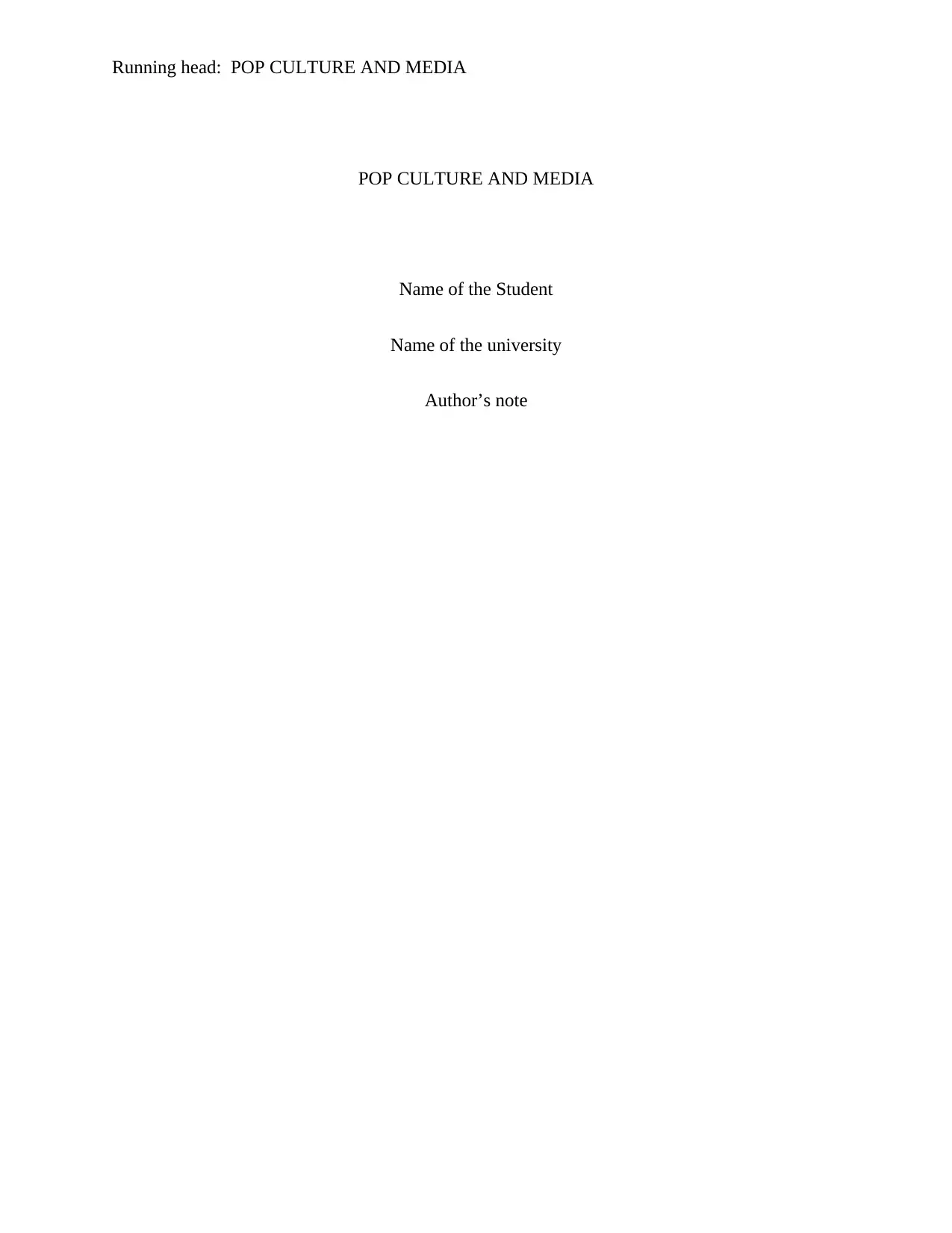
Running head: POP CULTURE AND MEDIA
POP CULTURE AND MEDIA
Name of the Student
Name of the university
Author’s note
POP CULTURE AND MEDIA
Name of the Student
Name of the university
Author’s note
Paraphrase This Document
Need a fresh take? Get an instant paraphrase of this document with our AI Paraphraser
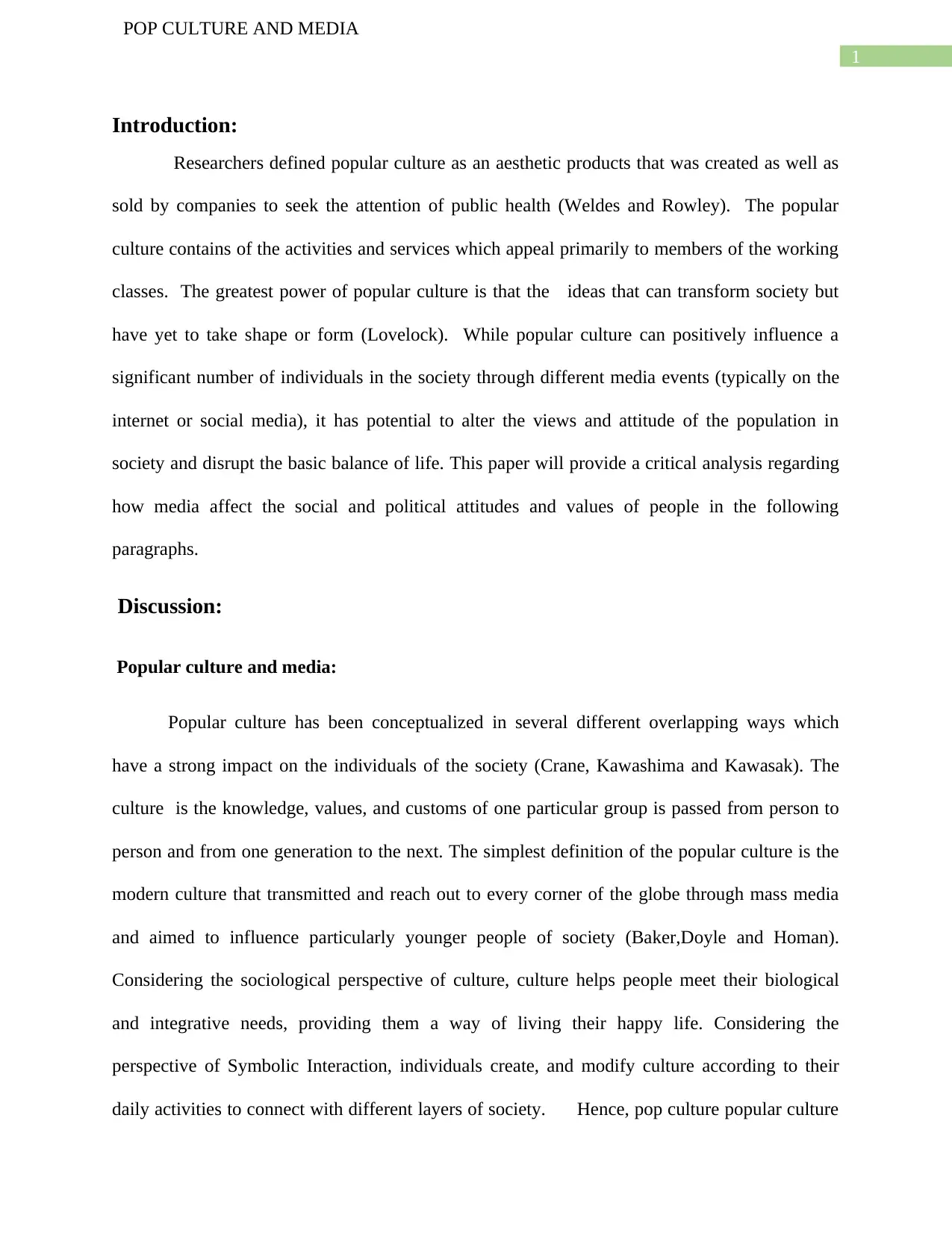
1
POP CULTURE AND MEDIA
Introduction:
Researchers defined popular culture as an aesthetic products that was created as well as
sold by companies to seek the attention of public health (Weldes and Rowley). The popular
culture contains of the activities and services which appeal primarily to members of the working
classes. The greatest power of popular culture is that the ideas that can transform society but
have yet to take shape or form (Lovelock). While popular culture can positively influence a
significant number of individuals in the society through different media events (typically on the
internet or social media), it has potential to alter the views and attitude of the population in
society and disrupt the basic balance of life. This paper will provide a critical analysis regarding
how media affect the social and political attitudes and values of people in the following
paragraphs.
Discussion:
Popular culture and media:
Popular culture has been conceptualized in several different overlapping ways which
have a strong impact on the individuals of the society (Crane, Kawashima and Kawasak). The
culture is the knowledge, values, and customs of one particular group is passed from person to
person and from one generation to the next. The simplest definition of the popular culture is the
modern culture that transmitted and reach out to every corner of the globe through mass media
and aimed to influence particularly younger people of society (Baker,Doyle and Homan).
Considering the sociological perspective of culture, culture helps people meet their biological
and integrative needs, providing them a way of living their happy life. Considering the
perspective of Symbolic Interaction, individuals create, and modify culture according to their
daily activities to connect with different layers of society. Hence, pop culture popular culture
POP CULTURE AND MEDIA
Introduction:
Researchers defined popular culture as an aesthetic products that was created as well as
sold by companies to seek the attention of public health (Weldes and Rowley). The popular
culture contains of the activities and services which appeal primarily to members of the working
classes. The greatest power of popular culture is that the ideas that can transform society but
have yet to take shape or form (Lovelock). While popular culture can positively influence a
significant number of individuals in the society through different media events (typically on the
internet or social media), it has potential to alter the views and attitude of the population in
society and disrupt the basic balance of life. This paper will provide a critical analysis regarding
how media affect the social and political attitudes and values of people in the following
paragraphs.
Discussion:
Popular culture and media:
Popular culture has been conceptualized in several different overlapping ways which
have a strong impact on the individuals of the society (Crane, Kawashima and Kawasak). The
culture is the knowledge, values, and customs of one particular group is passed from person to
person and from one generation to the next. The simplest definition of the popular culture is the
modern culture that transmitted and reach out to every corner of the globe through mass media
and aimed to influence particularly younger people of society (Baker,Doyle and Homan).
Considering the sociological perspective of culture, culture helps people meet their biological
and integrative needs, providing them a way of living their happy life. Considering the
perspective of Symbolic Interaction, individuals create, and modify culture according to their
daily activities to connect with different layers of society. Hence, pop culture popular culture
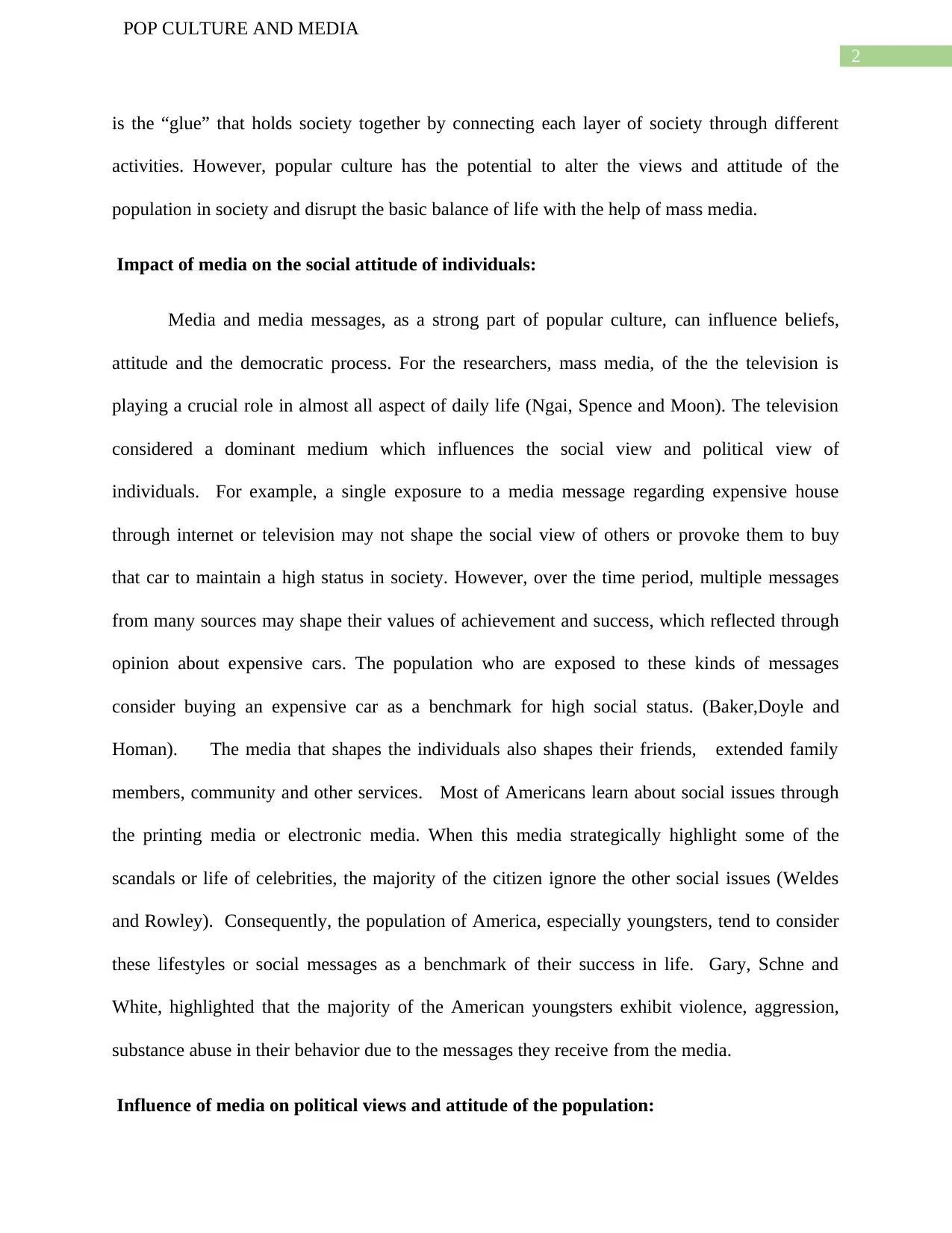
2
POP CULTURE AND MEDIA
is the “glue” that holds society together by connecting each layer of society through different
activities. However, popular culture has the potential to alter the views and attitude of the
population in society and disrupt the basic balance of life with the help of mass media.
Impact of media on the social attitude of individuals:
Media and media messages, as a strong part of popular culture, can influence beliefs,
attitude and the democratic process. For the researchers, mass media, of the the television is
playing a crucial role in almost all aspect of daily life (Ngai, Spence and Moon). The television
considered a dominant medium which influences the social view and political view of
individuals. For example, a single exposure to a media message regarding expensive house
through internet or television may not shape the social view of others or provoke them to buy
that car to maintain a high status in society. However, over the time period, multiple messages
from many sources may shape their values of achievement and success, which reflected through
opinion about expensive cars. The population who are exposed to these kinds of messages
consider buying an expensive car as a benchmark for high social status. (Baker,Doyle and
Homan). The media that shapes the individuals also shapes their friends, extended family
members, community and other services. Most of Americans learn about social issues through
the printing media or electronic media. When this media strategically highlight some of the
scandals or life of celebrities, the majority of the citizen ignore the other social issues (Weldes
and Rowley). Consequently, the population of America, especially youngsters, tend to consider
these lifestyles or social messages as a benchmark of their success in life. Gary, Schne and
White, highlighted that the majority of the American youngsters exhibit violence, aggression,
substance abuse in their behavior due to the messages they receive from the media.
Influence of media on political views and attitude of the population:
POP CULTURE AND MEDIA
is the “glue” that holds society together by connecting each layer of society through different
activities. However, popular culture has the potential to alter the views and attitude of the
population in society and disrupt the basic balance of life with the help of mass media.
Impact of media on the social attitude of individuals:
Media and media messages, as a strong part of popular culture, can influence beliefs,
attitude and the democratic process. For the researchers, mass media, of the the television is
playing a crucial role in almost all aspect of daily life (Ngai, Spence and Moon). The television
considered a dominant medium which influences the social view and political view of
individuals. For example, a single exposure to a media message regarding expensive house
through internet or television may not shape the social view of others or provoke them to buy
that car to maintain a high status in society. However, over the time period, multiple messages
from many sources may shape their values of achievement and success, which reflected through
opinion about expensive cars. The population who are exposed to these kinds of messages
consider buying an expensive car as a benchmark for high social status. (Baker,Doyle and
Homan). The media that shapes the individuals also shapes their friends, extended family
members, community and other services. Most of Americans learn about social issues through
the printing media or electronic media. When this media strategically highlight some of the
scandals or life of celebrities, the majority of the citizen ignore the other social issues (Weldes
and Rowley). Consequently, the population of America, especially youngsters, tend to consider
these lifestyles or social messages as a benchmark of their success in life. Gary, Schne and
White, highlighted that the majority of the American youngsters exhibit violence, aggression,
substance abuse in their behavior due to the messages they receive from the media.
Influence of media on political views and attitude of the population:
⊘ This is a preview!⊘
Do you want full access?
Subscribe today to unlock all pages.

Trusted by 1+ million students worldwide
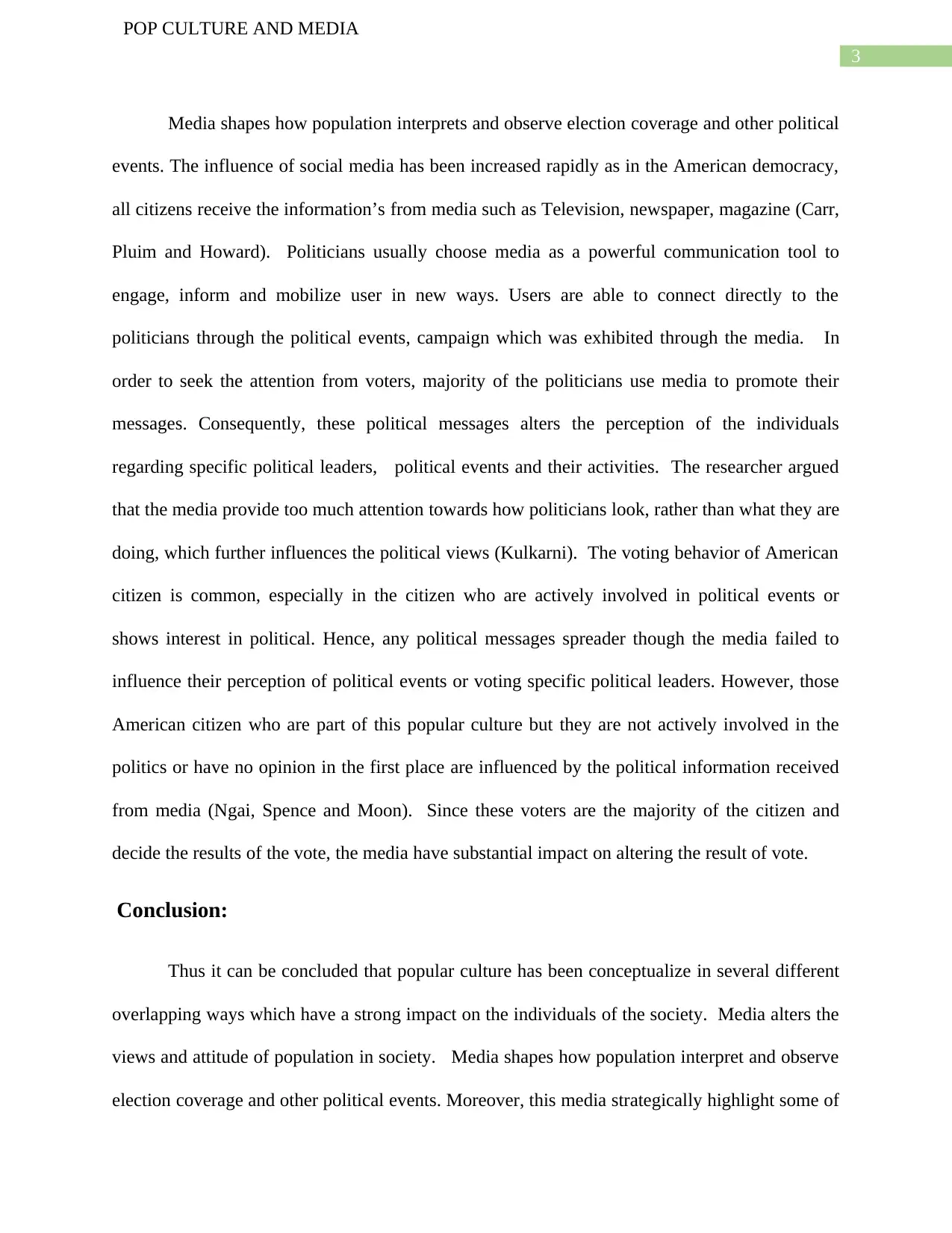
3
POP CULTURE AND MEDIA
Media shapes how population interprets and observe election coverage and other political
events. The influence of social media has been increased rapidly as in the American democracy,
all citizens receive the information’s from media such as Television, newspaper, magazine (Carr,
Pluim and Howard). Politicians usually choose media as a powerful communication tool to
engage, inform and mobilize user in new ways. Users are able to connect directly to the
politicians through the political events, campaign which was exhibited through the media. In
order to seek the attention from voters, majority of the politicians use media to promote their
messages. Consequently, these political messages alters the perception of the individuals
regarding specific political leaders, political events and their activities. The researcher argued
that the media provide too much attention towards how politicians look, rather than what they are
doing, which further influences the political views (Kulkarni). The voting behavior of American
citizen is common, especially in the citizen who are actively involved in political events or
shows interest in political. Hence, any political messages spreader though the media failed to
influence their perception of political events or voting specific political leaders. However, those
American citizen who are part of this popular culture but they are not actively involved in the
politics or have no opinion in the first place are influenced by the political information received
from media (Ngai, Spence and Moon). Since these voters are the majority of the citizen and
decide the results of the vote, the media have substantial impact on altering the result of vote.
Conclusion:
Thus it can be concluded that popular culture has been conceptualize in several different
overlapping ways which have a strong impact on the individuals of the society. Media alters the
views and attitude of population in society. Media shapes how population interpret and observe
election coverage and other political events. Moreover, this media strategically highlight some of
POP CULTURE AND MEDIA
Media shapes how population interprets and observe election coverage and other political
events. The influence of social media has been increased rapidly as in the American democracy,
all citizens receive the information’s from media such as Television, newspaper, magazine (Carr,
Pluim and Howard). Politicians usually choose media as a powerful communication tool to
engage, inform and mobilize user in new ways. Users are able to connect directly to the
politicians through the political events, campaign which was exhibited through the media. In
order to seek the attention from voters, majority of the politicians use media to promote their
messages. Consequently, these political messages alters the perception of the individuals
regarding specific political leaders, political events and their activities. The researcher argued
that the media provide too much attention towards how politicians look, rather than what they are
doing, which further influences the political views (Kulkarni). The voting behavior of American
citizen is common, especially in the citizen who are actively involved in political events or
shows interest in political. Hence, any political messages spreader though the media failed to
influence their perception of political events or voting specific political leaders. However, those
American citizen who are part of this popular culture but they are not actively involved in the
politics or have no opinion in the first place are influenced by the political information received
from media (Ngai, Spence and Moon). Since these voters are the majority of the citizen and
decide the results of the vote, the media have substantial impact on altering the result of vote.
Conclusion:
Thus it can be concluded that popular culture has been conceptualize in several different
overlapping ways which have a strong impact on the individuals of the society. Media alters the
views and attitude of population in society. Media shapes how population interpret and observe
election coverage and other political events. Moreover, this media strategically highlight some of
Paraphrase This Document
Need a fresh take? Get an instant paraphrase of this document with our AI Paraphraser
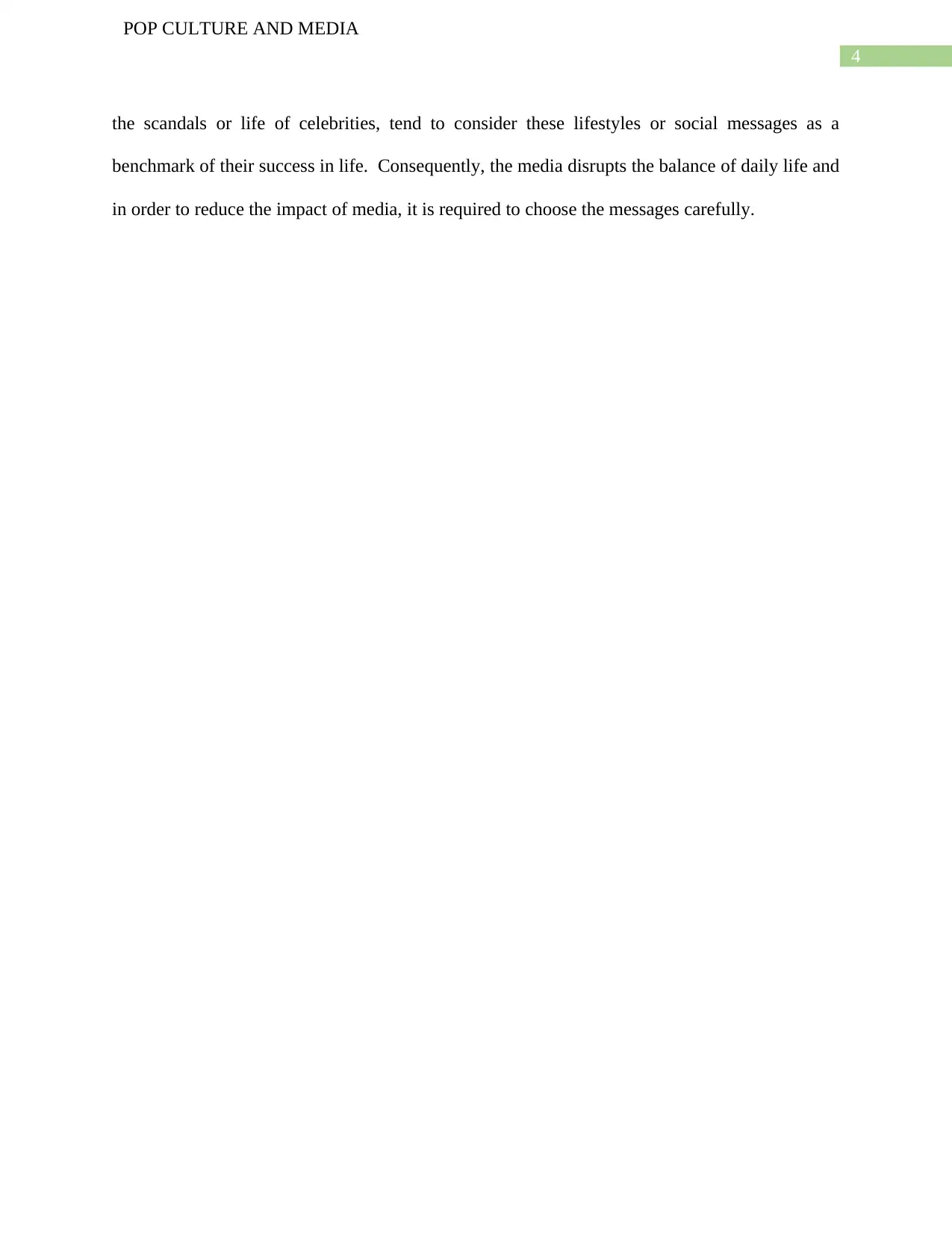
4
POP CULTURE AND MEDIA
the scandals or life of celebrities, tend to consider these lifestyles or social messages as a
benchmark of their success in life. Consequently, the media disrupts the balance of daily life and
in order to reduce the impact of media, it is required to choose the messages carefully.
POP CULTURE AND MEDIA
the scandals or life of celebrities, tend to consider these lifestyles or social messages as a
benchmark of their success in life. Consequently, the media disrupts the balance of daily life and
in order to reduce the impact of media, it is required to choose the messages carefully.
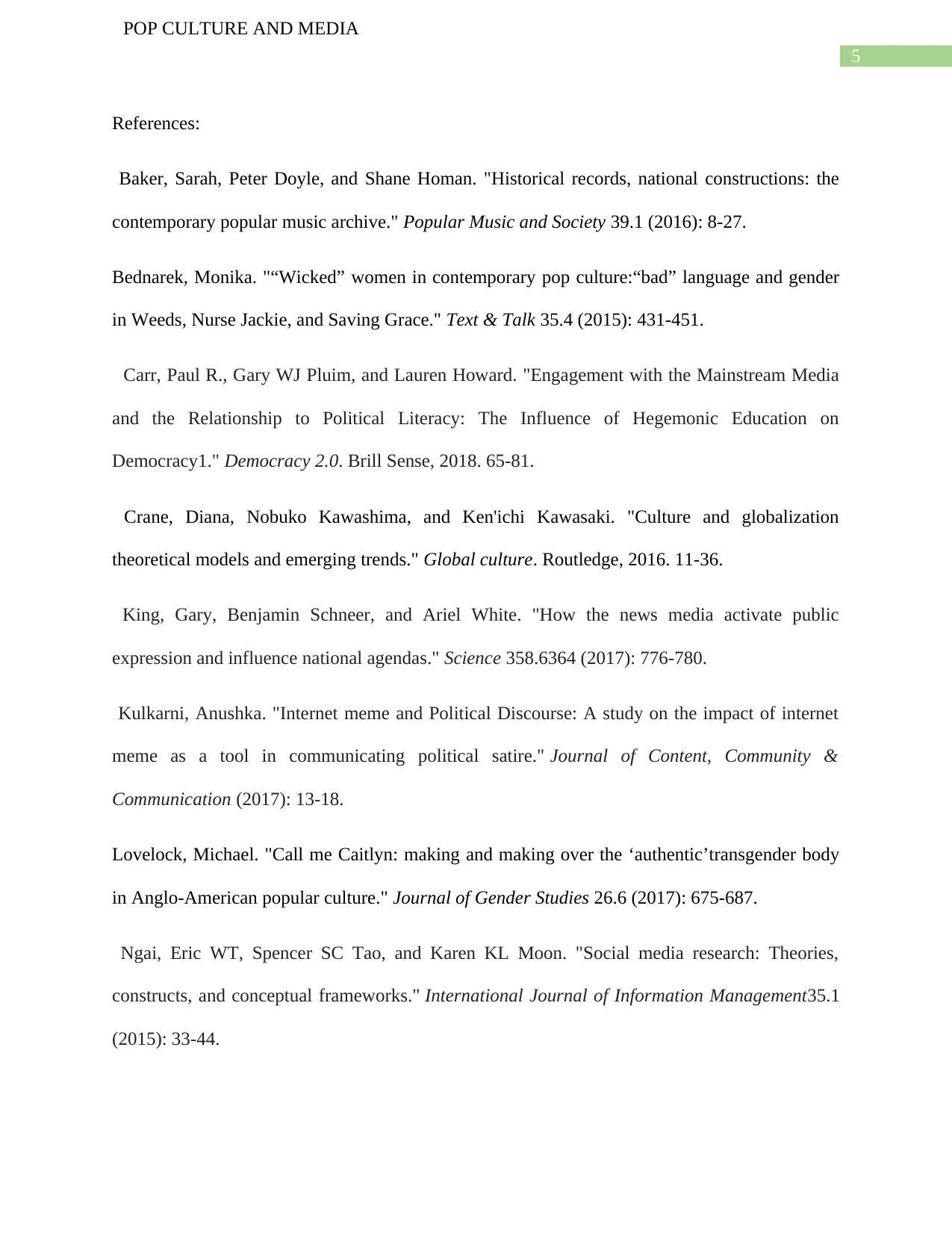
5
POP CULTURE AND MEDIA
References:
Baker, Sarah, Peter Doyle, and Shane Homan. "Historical records, national constructions: the
contemporary popular music archive." Popular Music and Society 39.1 (2016): 8-27.
Bednarek, Monika. "“Wicked” women in contemporary pop culture:“bad” language and gender
in Weeds, Nurse Jackie, and Saving Grace." Text & Talk 35.4 (2015): 431-451.
Carr, Paul R., Gary WJ Pluim, and Lauren Howard. "Engagement with the Mainstream Media
and the Relationship to Political Literacy: The Influence of Hegemonic Education on
Democracy1." Democracy 2.0. Brill Sense, 2018. 65-81.
Crane, Diana, Nobuko Kawashima, and Ken'ichi Kawasaki. "Culture and globalization
theoretical models and emerging trends." Global culture. Routledge, 2016. 11-36.
King, Gary, Benjamin Schneer, and Ariel White. "How the news media activate public
expression and influence national agendas." Science 358.6364 (2017): 776-780.
Kulkarni, Anushka. "Internet meme and Political Discourse: A study on the impact of internet
meme as a tool in communicating political satire." Journal of Content, Community &
Communication (2017): 13-18.
Lovelock, Michael. "Call me Caitlyn: making and making over the ‘authentic’transgender body
in Anglo-American popular culture." Journal of Gender Studies 26.6 (2017): 675-687.
Ngai, Eric WT, Spencer SC Tao, and Karen KL Moon. "Social media research: Theories,
constructs, and conceptual frameworks." International Journal of Information Management35.1
(2015): 33-44.
POP CULTURE AND MEDIA
References:
Baker, Sarah, Peter Doyle, and Shane Homan. "Historical records, national constructions: the
contemporary popular music archive." Popular Music and Society 39.1 (2016): 8-27.
Bednarek, Monika. "“Wicked” women in contemporary pop culture:“bad” language and gender
in Weeds, Nurse Jackie, and Saving Grace." Text & Talk 35.4 (2015): 431-451.
Carr, Paul R., Gary WJ Pluim, and Lauren Howard. "Engagement with the Mainstream Media
and the Relationship to Political Literacy: The Influence of Hegemonic Education on
Democracy1." Democracy 2.0. Brill Sense, 2018. 65-81.
Crane, Diana, Nobuko Kawashima, and Ken'ichi Kawasaki. "Culture and globalization
theoretical models and emerging trends." Global culture. Routledge, 2016. 11-36.
King, Gary, Benjamin Schneer, and Ariel White. "How the news media activate public
expression and influence national agendas." Science 358.6364 (2017): 776-780.
Kulkarni, Anushka. "Internet meme and Political Discourse: A study on the impact of internet
meme as a tool in communicating political satire." Journal of Content, Community &
Communication (2017): 13-18.
Lovelock, Michael. "Call me Caitlyn: making and making over the ‘authentic’transgender body
in Anglo-American popular culture." Journal of Gender Studies 26.6 (2017): 675-687.
Ngai, Eric WT, Spencer SC Tao, and Karen KL Moon. "Social media research: Theories,
constructs, and conceptual frameworks." International Journal of Information Management35.1
(2015): 33-44.
⊘ This is a preview!⊘
Do you want full access?
Subscribe today to unlock all pages.

Trusted by 1+ million students worldwide

6
POP CULTURE AND MEDIA
Weldes, Jutta, and Christina Rowley. "So, how does popular culture relate to world
politics?." Popular culture and world politics: Theories, methods, pedagogies (2015): 11-34.
POP CULTURE AND MEDIA
Weldes, Jutta, and Christina Rowley. "So, how does popular culture relate to world
politics?." Popular culture and world politics: Theories, methods, pedagogies (2015): 11-34.
1 out of 7
Related Documents
Your All-in-One AI-Powered Toolkit for Academic Success.
+13062052269
info@desklib.com
Available 24*7 on WhatsApp / Email
![[object Object]](/_next/static/media/star-bottom.7253800d.svg)
Unlock your academic potential
Copyright © 2020–2026 A2Z Services. All Rights Reserved. Developed and managed by ZUCOL.




